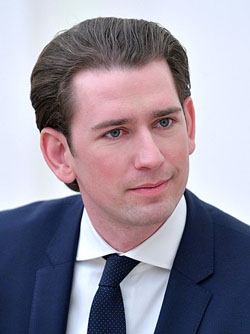
JERUSALEM (Press Release)– Austrian Federal Chancellor Sebastian Kurz declared at the 2018 AJC Global Forum that the Austrian government viewed both the fight against anti-Semitism and the security of the state of Israel as part of his country’s Staatsräson, or national interest.
Kurz also noted his government’s support for Israel as a Jewish state, announced plans for Holocaust education, and urged his audience to draw hope from post-World War Europe for a vision of regional peace.
American Jewish Committee CEO David Harris, who spontaneously joined Kurz on the stage immediately after he spoke, recalled that it was not until 1991 that Austria acknowledged its own central role in the Holocaust and its historic responsibility to fight anti-Semitism.
“But I always knew there was another piece to the puzzle. The Federal Republic of Germany, after the war, understood that it had an obligation to both the Jewish people and the Jewish state,” said Harris, the son of a survivor from Vienna. “For the first time in 73 years, you have heard an Austrian Chancellor accept the responsibility of Austria to the state of Israel and its security, as a matter of Staatsräson for Austria. History has just been made at the AJC Global Forum. This was the first time the word Staatsräson was ever used by an Austrian leader to describe the country’s relationship to Israel.”
Kurz opened his speech by paying homage to the great strides Israel has made in its 70-year history. “70 years ago, Israel was built on the devastation that was left behind by the Second World War. Today, it is a stronghold of democracy and liberty in the Middle East,” he said. “70 years ago, Jews from around the world started to build up their country from nothing. Today, Israel is a world leader in innovation and technology.”
Kurz emphasized that “our newly-formed government has a proactive agenda when it comes to supporting the state of Israel. And for the first time, there is a clear and formal commitment in the coalition program to Israel as a Jewish state.”
The Chancellor also made clear his commitment to supporting Israel’s security needs. “The security of Israel is not negotiable to us,” he proclaimed.
“We understand the serious security threats Israel is facing. We, therefore, fully condemn all acts of violence, inside Israel, at its borders and beyond,” he said. “The security situation of Israel is not comparable to any other country because we all know: When it comes to war, other countries may lose one or more battles, but can still survive. With Israel, it’s different. Israel is a strong but small country. It cannot afford to lose even one single battle, as this would determine its end.”
Much of his speech addressed Holocaust accountability head-on. “We are not only responsible for what we do, but also for what we do not do,” said the 31-year-old Austrian leader, as he described his own personal encounters with survivors, starting when he was a high-school student. “Because my generation is one of the very last to be able to have such conversations, we have an important responsibility to listen carefully to what happened, and to take these lessons to heart.”
“As the representative of Austria, I have to admit that there were many people in Austria who did nothing to fight the Nazi regime. Far too many actively supported these horrors and even were perpetrators,” he said. “At that time, many Austrians supported a system which murdered more than six million Jews from all over Europe and beyond, among them more than 60,000 fellow Austrian Jewish citizens.”
Kurz also made clear his commitment to Holocaust education, announcing that his government will implement a new program bringing Austrian school children to the Mauthausen concentration camp, construct a new Holocaust memorial in Vienna – including the names of all 60,000 Holocaust victims – and establish the Shoah Heritage Collection Center, with one million Euros, at Yad Vashem.
“It is our duty and obligation to ensure that the Shoah will never happen again, and that my generation and succeeding generations will never forget these horrible crimes,” he said. “Austrian legislation,” he added, “forbids neo-Nazi activity and Holocaust denial.”
“The most important lesson from the past is that we must actively protect our rule of law, our democracy, and fight each and every kind of extremism and intolerance,” said Kurz, adding that “Austria bears a special historic responsibility to support Jewish life in our country and to protect it against all forms of anti-Semitism.”
Ending on a more optimistic note, Kurz pointed out that Europeans today take the continent’s unification for granted, but, in reality, they had to undergo a healing process after World War II.
“Today, my generation takes it for granted to be able to study in France or to work in Belgium. Today, my generation takes it for granted that Austrian companies are invested in Poland or Hungary. Today, we take it for granted that tourists from all over Europe come to visit Vienna or ski in the Alps. But it was not always like this.”
However, he noted, this healing process takes dedication from all sides. “As in Europe after the war, however, this takes commitment and patience. And for sure Israel cannot achieve this alone. Commitment to a peaceful future is needed from all sides. Austria will keep on reminding its counterparts in this region that Israel is here to stay, and that it is their duty to find a way to accommodate themselves with this fact.”
The AJC Global Forum is the premier global Jewish advocacy organization’s signature annual event. More than 2,400 people, from 56 countries on six continents, are attending the conference in Jerusalem, the first time it has been held outside the United States in AJC’s 112-year history.
*
Preceding provided by the American Jewish Committee (AJC).